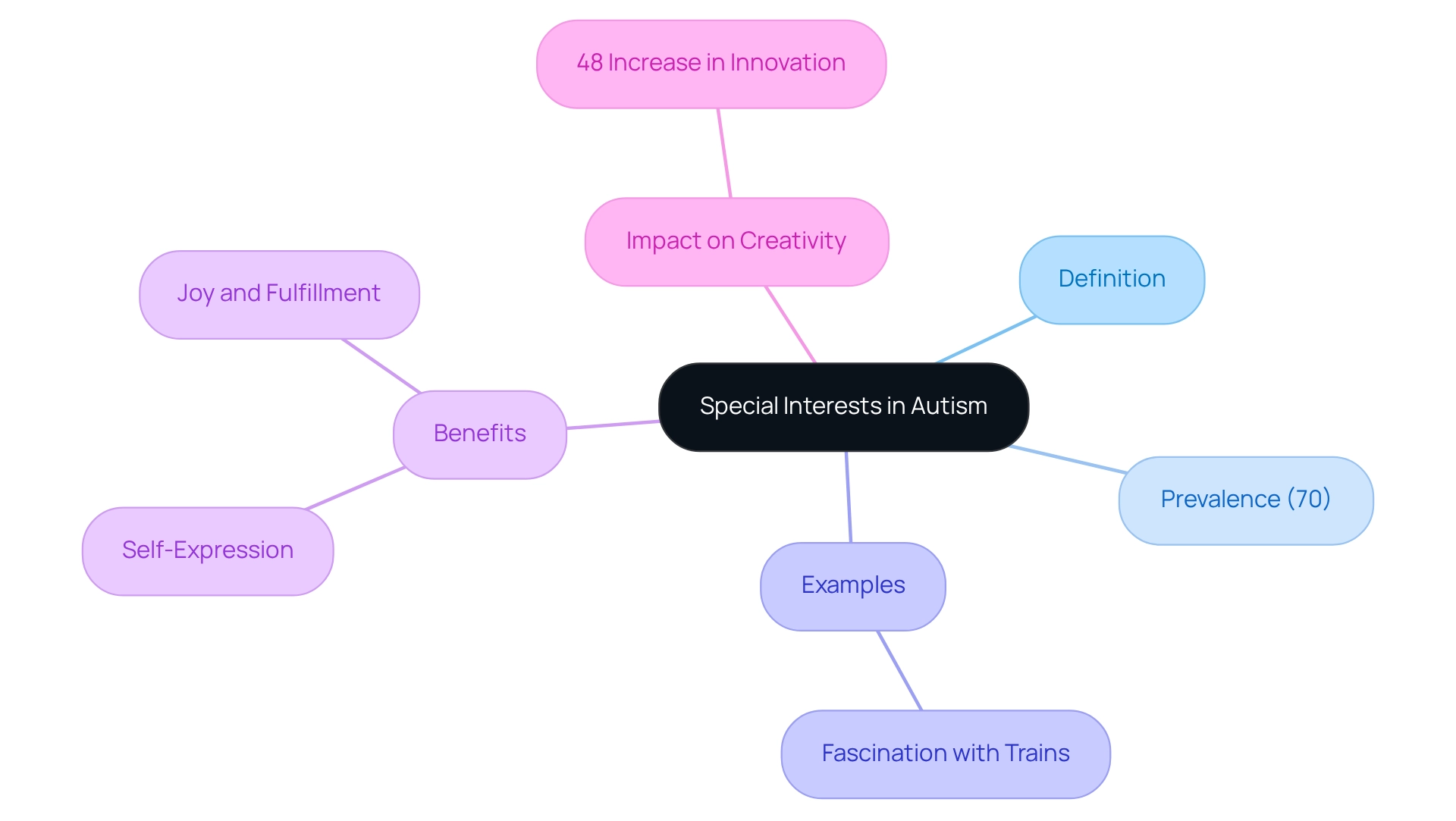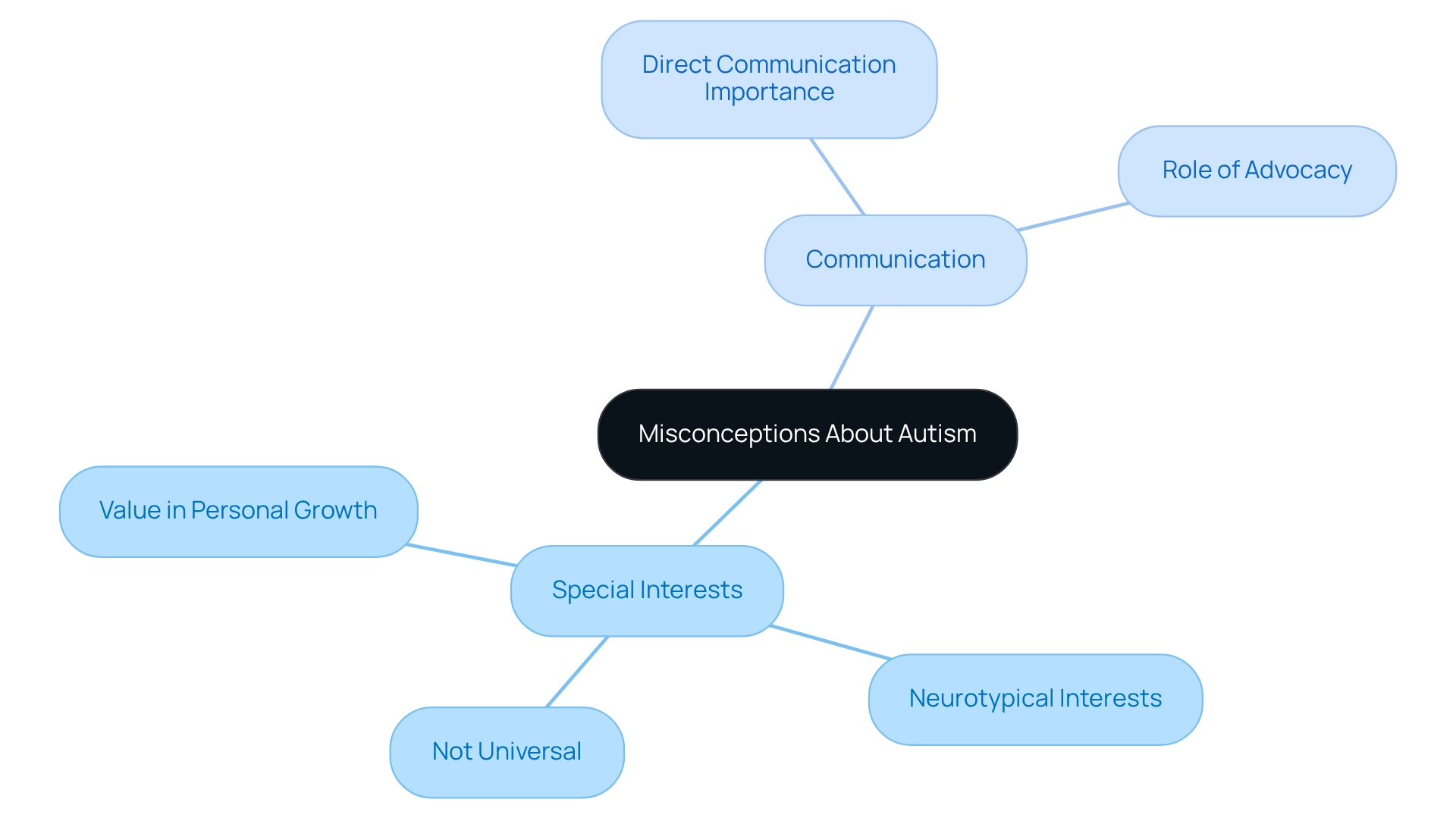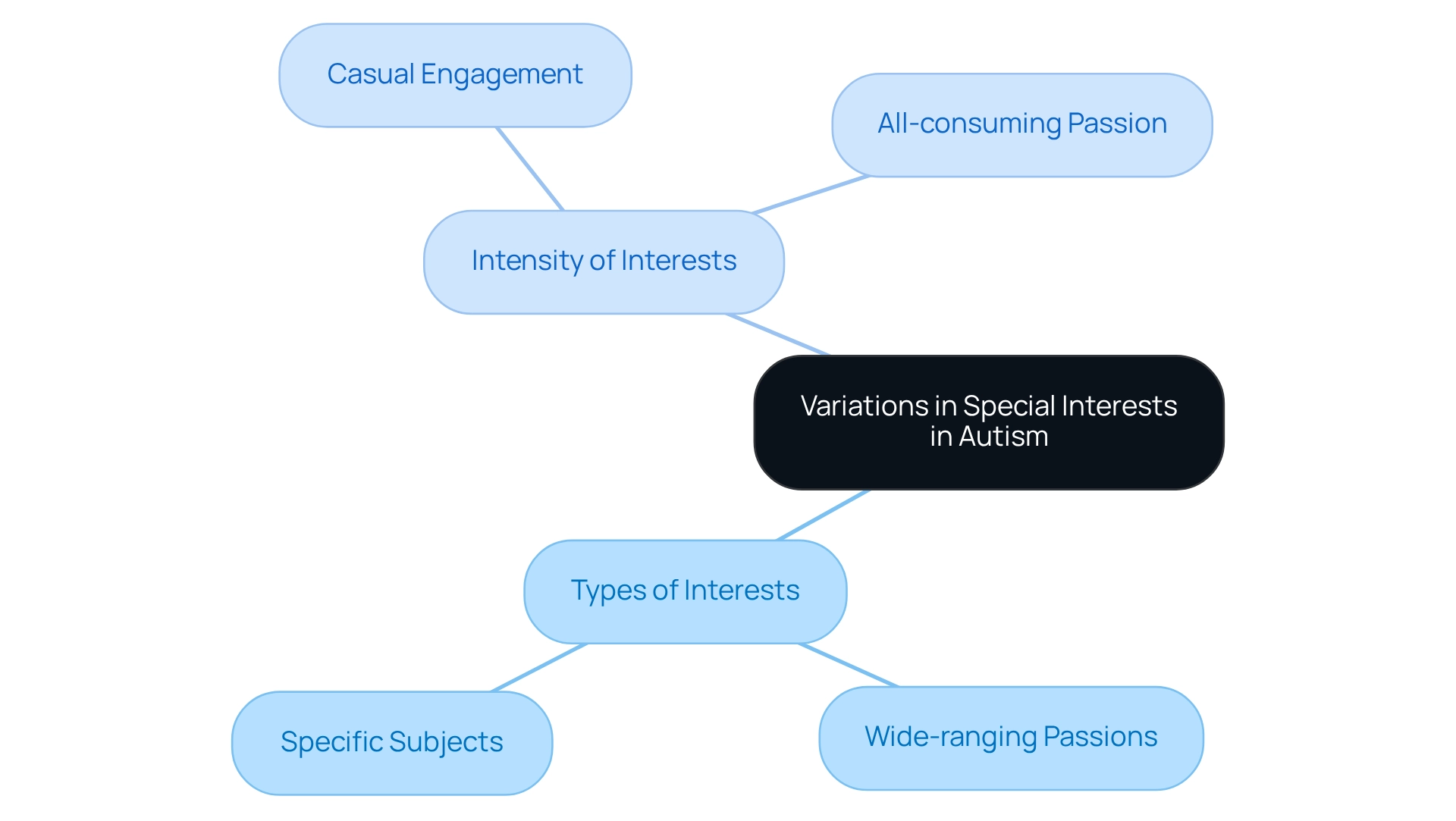Overview
Not all autistic individuals share the same experiences, and it's essential to recognize this diversity. While approximately 70% of autistic people do exhibit unique passions, there are also those who may not display any particular fixation at all. This highlights the varied intensity and nature of interests within the spectrum. Understanding these differences is crucial for providing the tailored support and interventions that individuals with autism truly need. By fostering this understanding, we can better address the unique challenges faced by each person, ensuring they receive the compassionate care and resources that resonate with their individual journey.
Introduction
In the intricate world of autism, special interests stand out as profound and defining passions. They not only shape individual identities but also serve as vital tools for connection and learning. These interests, often more intense than typical hobbies, provide a sanctuary of comfort and stability in a landscape that can feel overwhelming.
With approximately 70% of autistic individuals cultivating such interests, we see that their implications extend beyond personal fulfillment. They pave the way for innovative thinking and social engagement. As society shifts its perspective on these unique passions, understanding their significance becomes crucial.
By fostering environments where autistic individuals can thrive, express themselves, and build meaningful relationships, we can create a more inclusive world.
Define Special Interests in Autism
It is often asked whether do all autistic people have special interests, as particular passions in autism are characterized as intensely focused enthusiasms that individuals on the autism spectrum often develop. These passions are typically more profound and engaging than general pastimes, allowing individuals to immerse themselves completely. For example, an autistic person might cultivate a deep fascination with trains, dedicating significant time to exploring various models, routes, and historical contexts. Unlike general preferences, which may change over time, particular passions tend to remain stable, providing a comforting and reliable source of identity. They play a crucial role in self-expression and can significantly enhance a person's joy and fulfillment.
Studies indicate that around 70% of individuals with autism possess unique passions, leading to the inquiry of whether do all autistic people have special interests that can serve as a valuable resource for learning and social interaction. By nurturing these passions, individuals can uncover new pathways for personal growth and achievement. A case study titled "Future of Special Focus in Autism" highlights the considerable potential of these pursuits to enrich the lives of individuals with developmental disorders, showcasing how these passions can inspire creative thinking and collaboration. Indeed, diverse thinking approaches can lead to a 48% increase in innovation within collaborative teams, underscoring the importance of unique passions in fostering creativity. As Stephen Shore, an autism self-advocate and professor of special education, wisely states, "Every person with autism is distinct, and their unique passions should be respected and valued for their positive impact.

Explore the Importance of Special Interests
A vital role in the lives of many autistic individuals is played by unique passions, which leads to the question: do all autistic people have special interests that serve as essential coping strategies to alleviate anxiety and foster a sense of security in a world that can often feel overwhelming? By engaging deeply with these passions, individuals not only enhance their overall happiness but also discover a fulfilling outlet for self-expression. Remarkably, studies reveal that 86 percent of individuals pursue careers or educational paths aligned with their unique passions, underscoring the profound impact these enthusiasms can have on personal and professional satisfaction.
Moreover, unique interests can significantly enrich social interactions. They often provide common ground for conversations, allowing connections to flourish with peers who share similar passions. For instance, a child fascinated by dinosaurs may find it easier to build friendships with classmates who share that enthusiasm, thereby enhancing social skills and fostering meaningful relationships. This shift in perspective regarding specific interests—previously viewed negatively, as highlighted in the case study titled 'The Paradigm Shift in Understanding Specific Interests'—now leads us to ask, do all autistic people have special interests, while recognizing their positive contributions to the lives of autistic individuals. This understanding nurtures a more supportive and inclusive environment where they can thrive through their passions. As one parent insightfully noted, 'These pursuits appear to make my child truly happy,' which underscores the importance of nurturing these passions in both therapeutic and educational settings.
Clarify Misconceptions About Special Interests
Misunderstandings surrounding autism are more common than one might think, and it's crucial to address these concerns with care. One prevalent misconception is that all autistic people have special interests, but this is not universally true. While many do have specific interests, it raises the question of whether all autistic people have special interests, as some may not display any particular fixation at all. Additionally, it’s often believed that special passions are solely a product of autism, yet neurotypical individuals can also have strong fascinations that enrich their lives.
Another misconception is that these passions are merely distractions or obsessions. In truth, they can serve as valuable tools for learning and personal growth. For instance, encouraging direct communication can significantly enhance interactions between autistic and non-autistic individuals, as supported by case studies that highlight the importance of clarity in communication. Furthermore, many high-masking autistic individuals face various misdiagnoses, which underscores the complexities of the condition and the diverse nature of their passions.
As Kaitlin Schifano emphasizes, it’s vital to integrate specific groups into advocacy initiatives, as they play a crucial role in understanding and supporting those on the autism spectrum. Increased awareness among healthcare professionals has also enriched our understanding of autism, making it essential to recognize these nuances. By doing so, we can foster a more inclusive and supportive environment for autistic individuals, encouraging everyone to contribute to this important dialogue.

Examine Variations in Special Interests
The distinct preferences among autistic individuals lead to the inquiry of whether all autistic people have special interests, highlighting a remarkable diversity in both substance and intensity. Some may have wide-ranging passions, like a general fascination with nature, while others might concentrate on very specific subjects, which raises the question: do all autistic people have special interests? The intensity with which these interests are pursued can vary greatly; some engage casually, while others display an all-consuming passion. For instance, a child might enjoy collecting stamps without delving deeply into their history, whereas another may dedicate hours to researching every detail of a specific stamp collection. Understanding whether all autistic people have special interests is crucial for customizing support and interventions to meet each person's unique needs.
Recent research, including the study titled 'Characterization of Special Interests in Autism Spectrum Disorder' published in the Journal of Autism and Developmental Disorders, raises the important question: do all autistic people have special interests? It emphasizes the need to recognize these differences. Acknowledging them can lead to more effective approaches for promoting success in individuals on the spectrum as they age. Kerri Nowell, a Pediatric Clinical Psychologist at MU Thompson Center, emphasizes that "the research is aimed at enhancing support for individuals on the spectrum so they can achieve the greatest success as they age."
For example, studies have shown that identifying specific subsets of autism can aid in developing targeted interventions that cater to the distinct interests and needs of individuals, ultimately enhancing their overall development and well-being. The case study titled 'Understanding Autism Spectrum Variability' further illustrates how recognizing the wide variability within the spectrum is essential for creating tailored interventions. By fostering this understanding, we can better support those we care about on their unique journeys.

Conclusion
Special interests in autism are not just hobbies; they are profound aspects of identity that bring comfort, joy, and connection. With around 70% of autistic individuals deeply engaging with these passions, it is evident that special interests are crucial for personal fulfillment and social interaction. They act as vital tools for learning, innovation, and self-expression, enriching the lives of those who embrace them.
Moreover, recognizing the significance of special interests can transform societal views, creating environments where autistic individuals can flourish. These interests not only help reduce anxiety but also open doors for meaningful social connections, enabling individuals to bond with peers over shared passions. As we clarify misconceptions surrounding special interests, it is essential to acknowledge their positive impact and the uniqueness of each person's journey.
The variety and intensity of special interests highlight the necessity for personalized support and interventions. By understanding these differences, we can develop effective strategies that promote growth and development, ultimately leading to greater success and happiness for autistic individuals. By valuing and respecting special interests, we can work towards a more inclusive world where everyone is free to express their passions and thrive.
Frequently Asked Questions
What are special interests in autism?
Special interests in autism are intensely focused passions that individuals on the autism spectrum often develop. These interests are typically more profound and engaging than general hobbies, allowing individuals to immerse themselves completely.
Do all autistic people have special interests?
Not all autistic people have special interests, but studies indicate that around 70% of individuals with autism possess unique passions.
How do special interests benefit individuals with autism?
Special interests provide a comforting and reliable source of identity, enhance self-expression, and can significantly increase joy and fulfillment. They can also serve as valuable resources for learning and social interaction.
Can special interests lead to personal growth?
Yes, by nurturing their passions, individuals with autism can uncover new pathways for personal growth and achievement.
What is the significance of diverse thinking approaches related to special interests?
Diverse thinking approaches can lead to a 48% increase in innovation within collaborative teams, highlighting the importance of unique passions in fostering creativity.
Who is Stephen Shore and what does he say about autism and special interests?
Stephen Shore is an autism self-advocate and professor of special education. He emphasizes that every person with autism is distinct, and their unique passions should be respected and valued for their positive impact.




